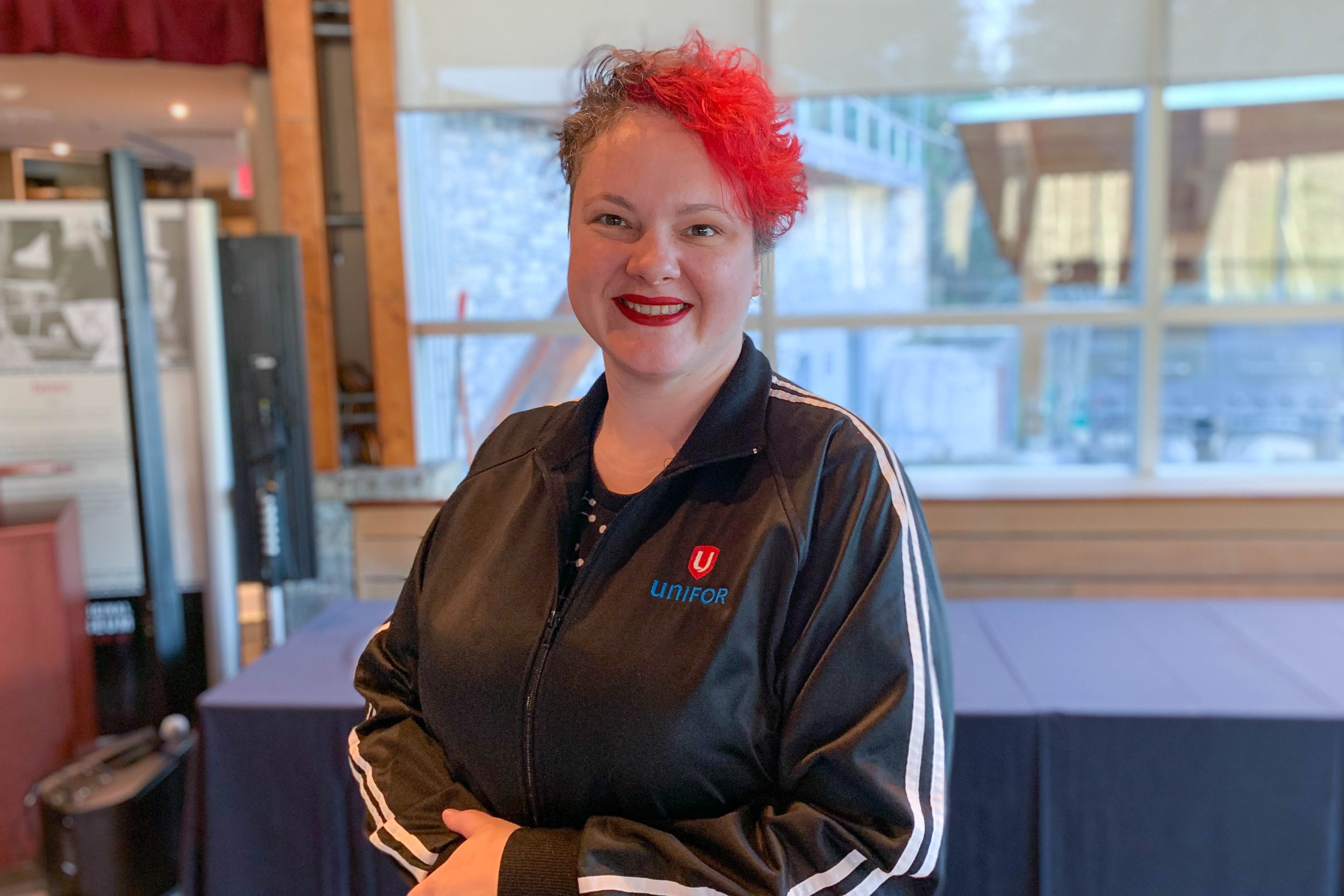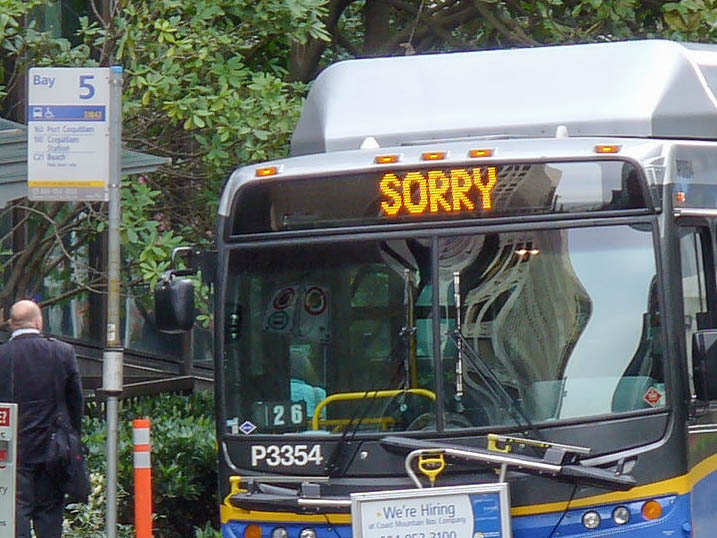Krista Lee Hanson says her needs are simple. She just wants to deliver people safely from point A to point B in her bus without feeling like her bladder will explode, to know when and where she’ll find a bathroom, and to be able to return to her bus without passengers telling her off.
Oh, and she’d like a sink to wash her hands in afterwards. Right now, her route’s got a Porta Potti.
“We’re just asking for access to warm running water and soap in a working city,” said the Vancouver bus driver of 15 years in an interview today.
But the dispute over those and other issues threaten to plunge Metro Vancouver into chaos next week.
Unifor, which represents the workers with Coast Mountain Bus Company, the TransLink subsidiary that operates Metro Vancouver’s bus and SeaBus networks, today announced strike action that would shut down the system for three days starting Wednesday. The union is seeking to improve wages, benefits and working conditions.
“This is not a stunt,” said Unifor’s western regional director Gavin McGarrigle. “This is real.”
Drivers have borne the brunt of a system “under stress,” says the union. They’re microwaving their meals in a washroom, for example, or not drinking water in order to avoid bathroom breaks.
Union members have also noticed an increase in overcrowding and a rise in assaults on buses.
Bus system shutdowns are now planned for Nov. 27; Nov. 28; and Nov. 29. Service will resume on Nov. 30.
Job action began on Nov. 1, with 4,800 Unifor members — 3,800 bus drivers and 1,000 trade workers at the CMBC — refusing to wear uniforms and to work overtime.
There have also been SeaBus cancellations, as each sailing needs an engineer on board, many of whom regularly work overtime.
Unifor does not represent the Canada Line or SkyTrain employees, so the shutdowns will not affect service on those lines.
Workers have been without a contract since March.
Unifor Local 111, representing bus drivers, is asking for a 15.2-per-cent increase compounded over four years. The company has offered a 9.6-per-cent increase.
Unifor Local 2200, representing trades and maintenance workers, is asking for a 16.7 per cent increase compounded over four years. The CMBC had offered 12.2 per cent.
The company’s offer would mean a maximum salary increase to $69,900 for bus drivers and $88,000 a year for trades workers by the fourth year of the agreement, said company president Michael McDaniel last week.
TransLink has argued that the company doesn’t have the money to meet the wage increases the union has asked for — unless it raises fares, taxes or cuts service planned for transit expansion plans.
Hanson, 42, shared some of her thoughts with The Tyee over the phone from Whistler, where she was attending the Unifor BC Regional Council. Our interview has been edited for clarity.

The Tyee: The union has talked about the transit system being ‘under stress.’ How have you experienced that as a driver?
Krista Lee Hanson: When I started 15 years ago, our work was cut [scheduled] by people. Since then, it’s been cut by computers that are all about shaving seconds off. [TransLink told The Tyee that computers were always used to develop schedules, but what changed eight years ago is that GPS bus data were used to determine which schedules could be tightened.]*
I’ve frequently had to park my bus and then pick up another to drive the rest of my shift. This is called a “walkover,” and if it’s under 30 minutes, the two pieces of work are considered a “straight piece” and are unpaid. Sometimes it’s the bus behind; sometimes it’s 25 minutes away via transit.
This short period of time would be the time I’d use the washroom or eat something, but instead I’m parking and securing a bus, traveling to the second bus, and doing a walk around to ensure that it’s safe to go.
Since I’ve started, they’ve also started interlining — taking multiple routes and putting them end-to-end on the same bus. So you may leave the garage, then do five different routes. That means if there’s a problem on one route, the bus can’t get to another. This lessens the recovery time. In the past, if there’s a problem on Main Street, it would only affect Main Street.
Work is supposed to get better the longer you’re there. But my work isn’t better than the options I had a decade ago.
The Georgia Straight framed the strike like this: ‘Should the entire bus and SeaBus system be shut down so that transit operators can get longer bathroom breaks?’ Can you share why breaks are important for bus drivers?
The washroom at my terminus is a Porta Potti.
As someone who menstruates, I need to find somewhere else — wash my hands, that sort of thing.
Our members have lots of different medical reasons. Lots of our members are diabetic. If you’re testing your blood, you want to wash your hands. So we’re just asking for access to warm running water and soap in a working city.
There are many routes now with washrooms at the middle of the route.
For the 8 Fraser bus, our official washroom is the Breka Bakery at Fraser and 49th. A lot of people take that bus to catch the 100 bus down at Marine Drive. But Breka has a busy washroom! You might wait 10 minutes for it. And when you come back to the bus, everyone’s mad because they might have missed the 100.
So some of the real things that bus drivers do, and you might not think about this, is not drink water or not eat properly. Bus drivers have high rates of diabetes, bowel problems, urinary tract issues and that sort of thing, because we don’t take care of our bodies.
How are your fellow drivers dealing with the current wages?
Many of our members live in Mission or Squamish or Chilliwack or on the island. We have members that live in trailers Monday to Friday during their workdays in someone’s driveway or at a friend’s place or sleep on a friend’s couch. They can’t afford to own in the city, so they live here part time and the rest of their family is somewhere else. This is not a one-off; many members do this.
I’m also concerned about our mechanics, because we’re on two different [pay] scales.
What kind of benefits do drivers need the most?
I know a number of our members are frequently refused benefit coverage for prescriptions, especially for prescriptions related to diabetes. It’s a hard time getting those covered.
Mental health coverage in our benefits is also quite low. It would be a substantial improvement if we got that, because we have the kind of job where members witness people committing suicide, stabbings, overdoses and everything else.
I had a guy threaten me to my face because the bus turned at a different block. I’ve been assaulted and sexually assaulted a handful of times. And every bus driver has had someone yell at them: “I’m going to kill you.” That happens to all of us. We put up with a lot.
How would you explain the strike to bus riders who are upset about next week’s system shutdown?
Our number one goal is to get everyone safely from point A to point B. If I have to think about whether I can get to a bathroom on time or my blood sugar being low, that’s taking my concentration away from the road.
That’s why we’ve been so slow on this, with not wearing uniforms and not working overtime [the part of the first phase of job action]. We still want to move people around. We just worry about our ability to do so safely.
What do you love about your job?
I have the best office in town! I get to drive buses across the bridge and see the mountains and oceans. I get to take kids on field trips, get grandma to the doctor and give directions to visitors in our city. I love interacting with the public.
* Story updated on Nov. 21, 2019 at 11 a.m. TransLink responded to The Tyee’s request for information on bus schedule tightening after this story was published. ![]()
Read more: Transportation, Labour + Industry
















Tyee Commenting Guidelines
Comments that violate guidelines risk being deleted, and violations may result in a temporary or permanent user ban. Maintain the spirit of good conversation to stay in the discussion.
*Please note The Tyee is not a forum for spreading misinformation about COVID-19, denying its existence or minimizing its risk to public health.
Do:
Do not: